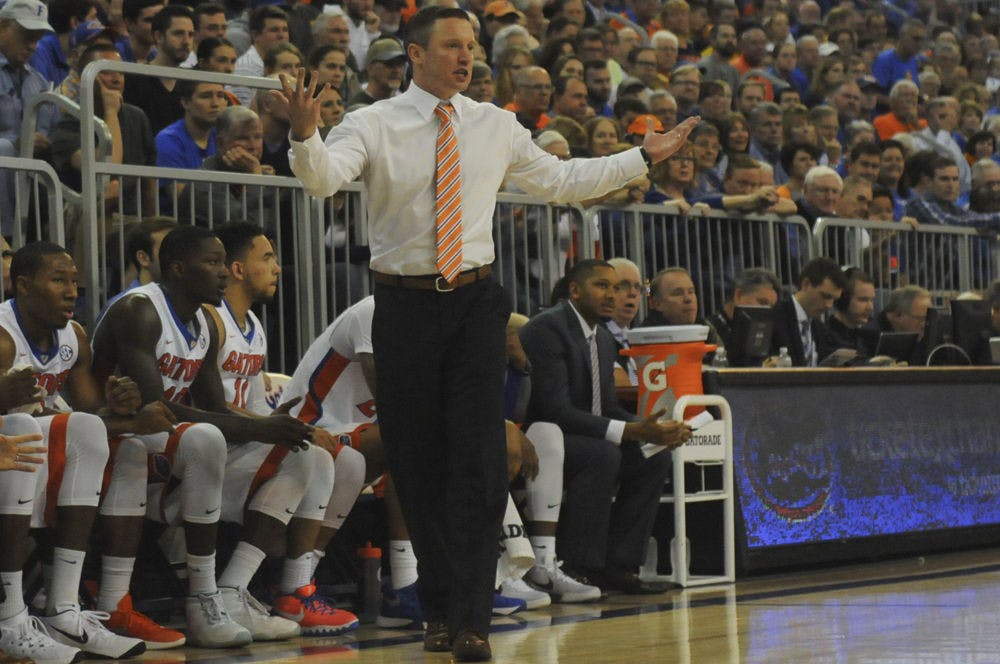Before it began, it didn’t seem as if the 2015-16 season would be one of success for the Gators. There were changes — a new coach, new players and a new scheme — and there were departures, the most monumental being Billy Donovan’s jump to the NBA.
And yet there Florida was on Saturday, up by five points against LSU with 10 seconds left in the second half. There was KeVaughn Allen, closely defending the Tigers' guard Tim Quarterman as Quarterman heaved a desperate three pointer with time running out. There was UF’s 6-foot-11 center John Egbunu, corralling the miss, tipping it in the air and into the hands of forward Justin Leon.
The final few seconds ticked off the clock, taking with them any remnants of UF’s loss three days earlier, a lackluster performance against Tennessee that turned into the Gators’ first Southeastern Conference defeat of the season.
"That wasn’t us," redshirt senior Dorian Finney-Smith said on Saturday. "So we had to prove it to ourselves."
But although Florida’s win over LSU was a positive for the Gators, it was also a reflection of Florida’s current state as a team: The Gators are a group still searching for their identity.
Mike White’s first year as coach has been about growth, about instilling a defense-first mentality into a mixture of young and old, new and familiar players. And when Florida doesn’t exhibit that mentality on the court, it flops.
Florida relies on its defense as much out of necessity as anything else. Although the Gators have plenty of natural scorers, none of them are strong perimeter shooters, and more often than not, their best offensive weapon is a gifted but streaky freshman in Allen.
So, as is probably obvious, Mike White’s team must be an elite defensive unit if it figures to stand a chance against good SEC teams.
Here’s what isn’t obvious.
So far this season, in the games when Florida has been at its best defensively, it has also been among the best in the nation.
Florida ranks 27th in the country in scoring defense — allowing just 63.5 points per game — ahead of all but five top-25 teams: No. 4 Virginia, No. 5 Michigan State, No. 11 Villanova, No. 16 Louisville and No. 20 Purdue.
Florida has the seventh best defensive quotient in the nation at 12.8, meaning that Florida is holding teams 12.8 points below their average scoring output on the season, ahead of all but four teams ranked inside the top-25.
And the Gators are doing all of this while playing the nation’s No. 5-ranked strength of schedule and the country’s sixth-most difficult non-conference schedule.
Before Saturday’s win over LSU, it felt as if Mike White’s team was trending backwards. Even though Florida's last Final Four appearance was only a year and a half ago, it appeared to be a program settling in for a rebuilding era after nearly a decade of expectations that resided somewhere between a Sweet 16 appearance and an NCAA title.
In addition, Florida’s 10-5 record three games into conference play appears indicative of the record Florida will have by the end of this season: around five games above .500, likely left out of the NCAA Tournament, and possibly, at best, with an invitation to the NIT.
But right now it’s still too soon to tell.
Florida is not a great team, but its defensive metrics have been too good and its schedule too strong to say that it is a bad one. And even with its inability to even put up just-average numbers on offense — it ranks last in the SEC in three out of five possible offensive categories — somewhere beneath this inconsistent Gator squad is an elite defensive team that is still struggling to consistently show it.
It may not happen in a couple weeks, or a couple months.
But there are signs, statistics and a growing body of evidence that White’s plan for an elite defensive unit will come to fruition, and sooner rather than later.
Follow Ian Cohen on Twitter @icohenb
UF coach Mike White reacts after a play during Florida’s 68-62 win over LSU on Jan. 9, 2016, in the O’Connell Center.






